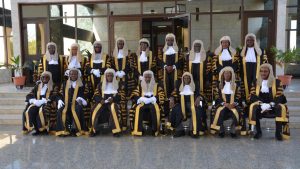ABUJA, Federal Republic of Nigeria. The Revenue Mobilisation Allocation and Fiscal Commission (RMAFC) has said it does not determine how much political office holders take home as pension at the end of their service.
This was contained in a statement by the commission’s head, Public Relations, Mr Ibrahim Mohammed, in Abuja, on Thursday.
It said RMAFC was forced to make the clarification based on misleading reports concerning pension benefits for political and other public office holders in Nigeria.
“To start with, the issue of pension for the president, vice president, governors and their deputies is strictly a constitutional matter.
“The RMAFC has never recommended pension for them, as it is not within its purview,” the statement read.
It said pension for president and the vice president was provided in Section (84) (5) of the 1999 Constitution.
“Any person who has held office as president or vice president shall be entitled to pension for life at a rate equivalent to the annual salary of the incumbent president or vice president.
“Provided that such a person was not removed from office by the process of impeachment or for breach of any provisions of this constitution.
“Any pension granted by virtue of subsection (5) of this section shall be a charge upon the Consolidated Revenue Fund of the Federation.
“From the foregoing, therefore, it is crystal clear that the commission is not constitutionally empowered to delve into matters of pension for political, public office holders as wrongly imputed,” it added.
RMAFC also drew attention to the difference between salary and allowances of political office holders.
According to the statement, salaries of political office holders were not as high as what was being peddled.
“It should be noted that the salaries and allowances of political, public and judicial office holder’s salaries are available at www.rmafc.gov.ng.”
It also stated the actual amount being paid to legislators and other public officers.
“It is, therefore, wrong and misleading to add up allowances, irrespective of whether they are regular, refundable or non-regular, as the regular annual emoluments of public office holders,” it stated.
It stated that the chief accounting officer should be held accountable if any political, public office holder was paid anything outside what was provided in the Remuneration Act of 2008.
Credit: Tribune (Nigeria)




